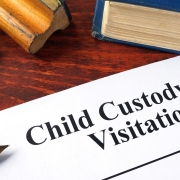The “Right Time” to Tell the Children About Divorce
Is There Ever a Right Time to Tell the Children About Divorce?
Have you ever delayed something because it didn’t feel like the “right time”?
Maybe you’ve told yourself, I’ll start going to the gym after this big project ends—I can’t mess this project up right now. It’s just not the right time.
Or perhaps you’ve thought, I’ll go on a diet once summer hits and the kids are at camp. I’ll have more time then.
This concept of waiting for the “right time” feels logical in the moment. But is it really? Or are we just using it as an excuse to delay tough decisions?
The truth is, it’s likely a mix of both. Depending on the circumstances, waiting might sometimes make sense. But often, waiting for the “right time” is a way to avoid something uncomfortable or challenging.
And this mindset can extend to much bigger life decisions—like the right time to divorce. This post isn’t about deciding whether to divorce, but rather about how to thoughtfully navigate the timing of discussions if that decision has already been made.
For many parents who want to divorce, it is excruciating to think about the impact of the divorce on the children. This stress leads to difficulty to decide the when…when to start the divorce discussions, when to tell the children, when to separate.
When Is the Right Time to Divorce and Tell the Children?
Let’s say you and your spouse have agreed separation or divorce is on the horizon. You and your spouse are concerned about the impact of household stress on the children. You may have wondered:
- Should we separate while the kids are young, so they have more time to adjust?
- Should we wait until they’re in high school, when they’re more emotionally mature?
- Or should we hold off until they’re away at college, so they don’t have to see the day-to-day impact?
Or, have you ever had this looping thought:
- I don’t want to tell the children in the summer so they can transition to school smoothly
- I don’t want to tell the children in the fall because it could ruin the holidays
- I don’t want to tell the children after New Year’s because I don’t want to ruin the vacation we have planned on school break
- I don’t want to tell the children after vacation because their birthday is coming up
- I don’t want to tell them in the spring so they are not distracted from ending the school year strong
- I don’t want to tell the children after school ends because I don’t want to ruin their summer
…and now it’s another school year.
It’s natural to hope for a “right” time to minimize the disruption to your children. But here’s the hard truth: there is no perfect time. There are only different times. Each stage of childhood comes with its own set of challenges, and each offers a unique dynamic to consider.
The Impact of Conflict at Home
One of the most important factors to weigh is the level of conflict or tension in the home. Prolonged exposure to marital strife can have a lasting impact on children, regardless of their age. Some couples choose to work through their conflicts and find ways to improve their marriage by going to therapy or marriage mediation. Others decide that restructuring the family is the best path forward. Either way, whether your kids are toddlers or teens, growing up in a household filled with unresolved conflict and emotional stress can affect their emotional and developmental well-being.
“Leaving the Nest” Example
Some parents believe waiting until the children are older—perhaps until they’ve left for college—is the best route. The thought process goes something like this: If we wait, they won’t have to deal with the divorce while they’re still living at home.
On the other hand, some parents believe telling the children before college is the best route. That thought process goes something like: If we wait, they will be alone and isolated without support from their friends or family.
No “Right” Time, Just Different Times
Rather than searching for the “right time” to talk, it’s more helpful to think about it in terms of timing that is most aligned with the well-being of your children and yourself. Divorce is difficult at any stage but so is staying in an unhappy or conflicted marriage. And it can be helpful to consider the impact of your children living in a household with parents who at best are functioning as roommates and at worst are in high conflict, exposing the children to tremendous stress.
Alternative Questions to “Is it the right time…”
- What is the most thoughtful and compassionate way to navigate divorce?
- Is it time to restructure our family and transform the marital relationship to a productive co-parenting relationship?
- What supports should we have in place for our children before we tell them about the divorce?
- How can we navigate a child-centered divorce process?
- How can we get on the same page about them messaging to our children?
- Who can we consult to get guidance and advice?
In the end, divorce isn’t about finding the “right” time. It’s about making sure that, whenever the time comes, your children’s emotional health and your own well-being are priorities.
There are only different times.









